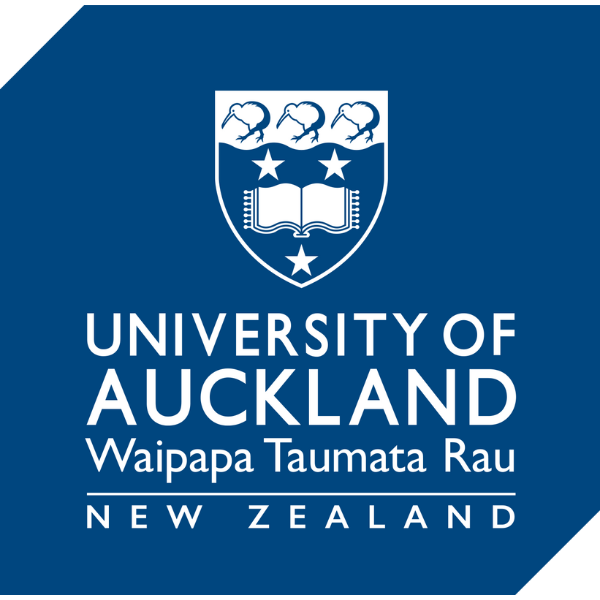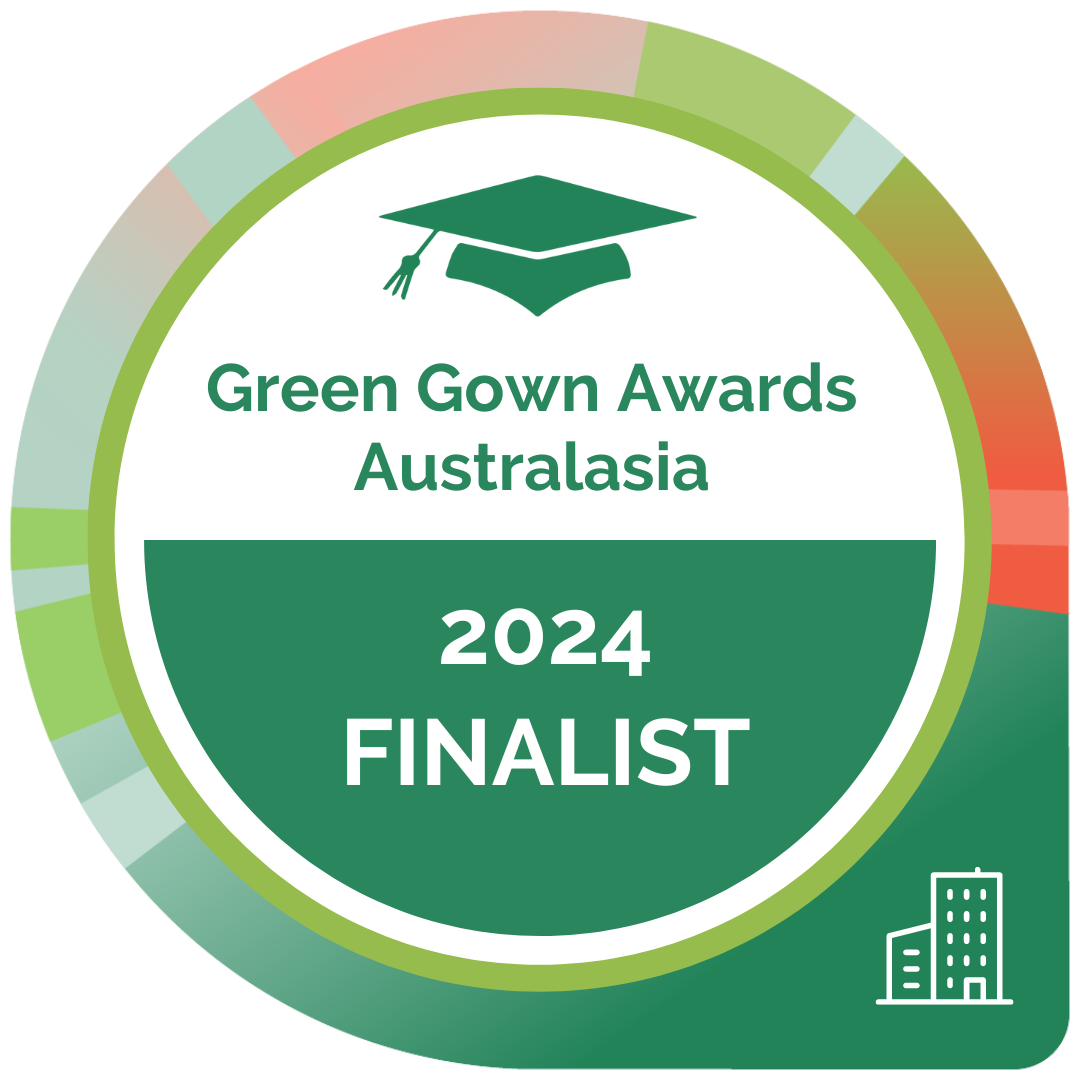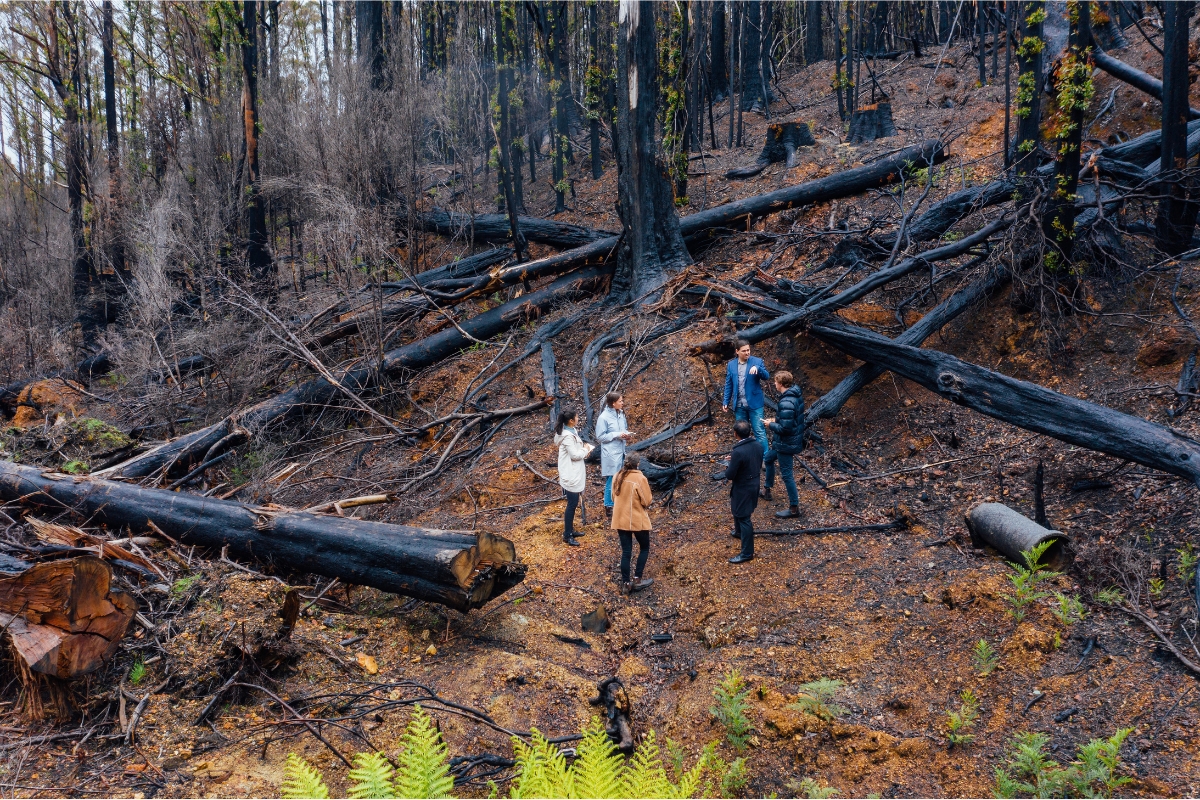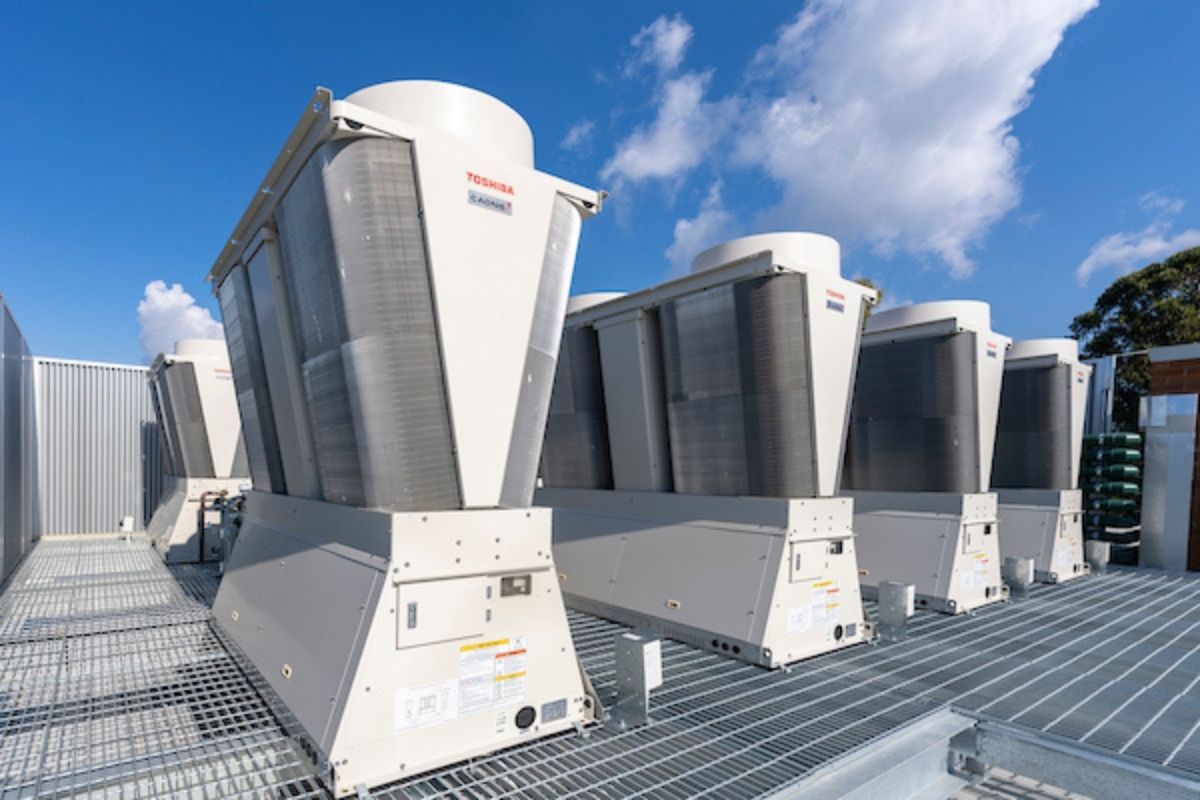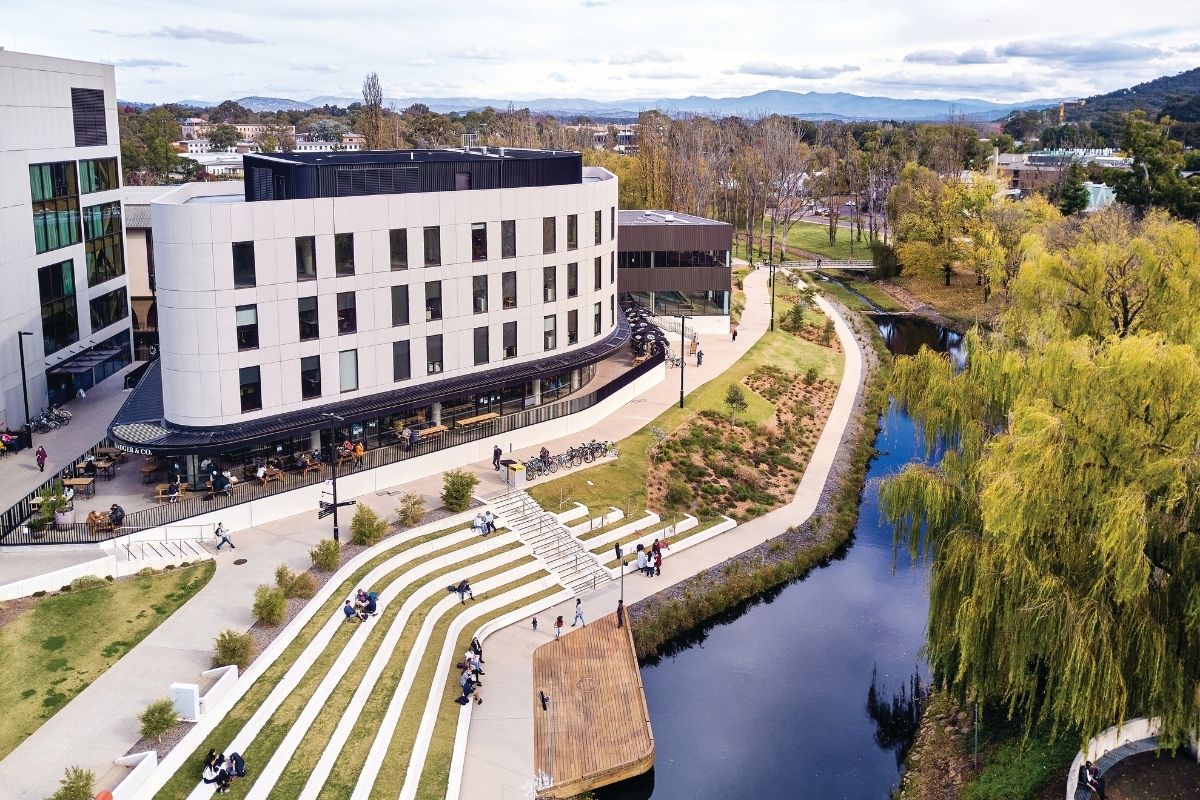Climate Action category
Waipapa Taumata Rau, University of Auckland has implemented an ambitious climate action initiative through the redevelopment of Building 201 (B201), a flagship project reflecting the university’s sustainability and net-zero carbon strategies and commitments. This project transformed a 50-year-old end-of-life building into a state-of-the-art, future-focused facility. With a focus on adaptive reuse, the redevelopment achieved a 6 Green Star rating for design from the New Zealand Green Building Council, and received the highest score for any building in New Zealand to date. B201 integrates cultural narratives, sustainable materials, and advanced technologies, setting a new benchmark in Aotearoa.
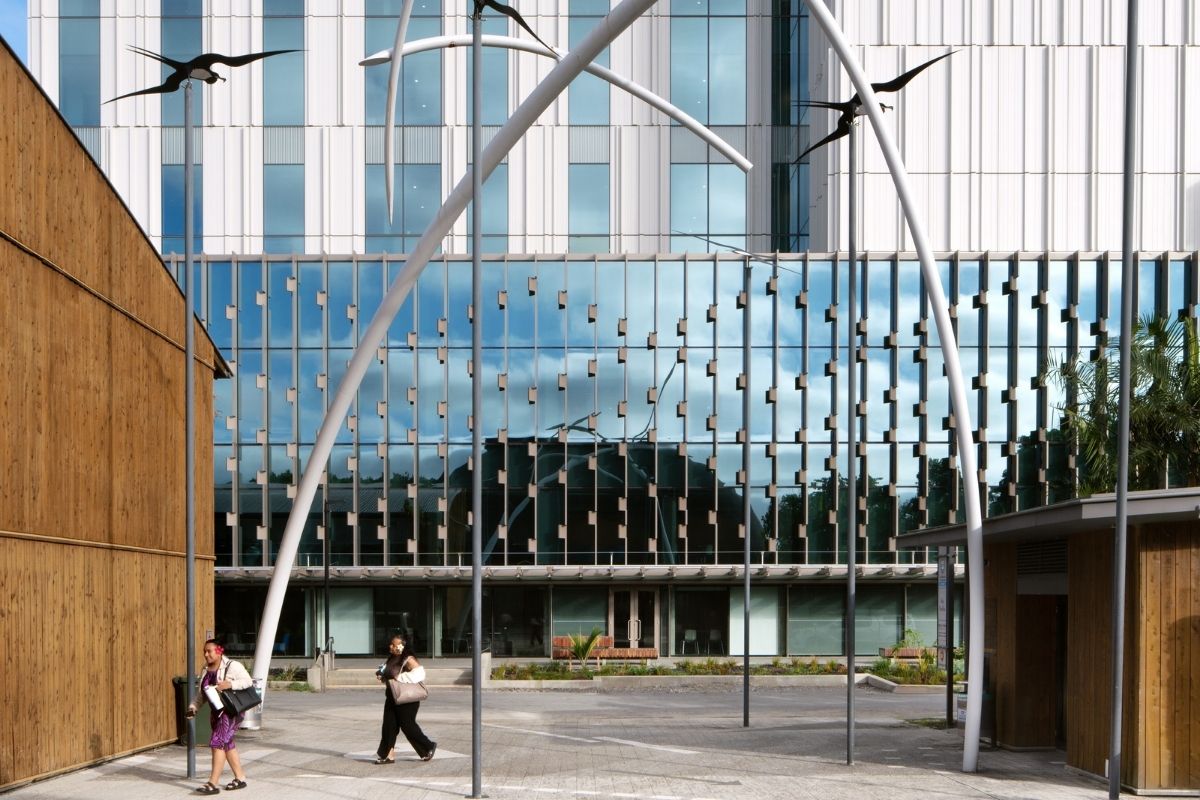
Environmental and Social Benefits
- Emission Reductions: The adaptive reuse strategy of B201 resulted in a 30% reduction in embodied carbon emissions and projected operational carbon emissions 70% lower than a comparable new building. The project’s alignment with Green Star criteria ensures comprehensive emission reductions across all scopes, contributing significantly to the university’s net-zero goals.
- Resource Conservation: The project emphasised circular economy principles, diverting 92% of construction and demolition waste from landfill. This approach is directly linked to the university’s commitment to sustainable procurement and waste minimisation.
- Social Empowerment: B201’s design includes extensive communal spaces and end-of-trip facilities, promoting social interaction and active commuting. The project’s cultural integration celebrates Māori heritage, enhancing the social fabric of the university community.
Leadership and Engagement
- Community and Industry Partnerships: The project team collaborated with architectural firms, construction companies, and cultural consultants, ensuring a holistic and inclusive approach. This partnership-driven model supports the university’s sustainability strategy and enhances community engagement.
- Policy Influence: By adhering to and exceeding Green Star requirements, B201 sets a precedent for sustainable development in the higher education sector, influencing policy and practice at a national level.
Significance to the Sector
- Global Recognition: B201 is the first tertiary education building in Australasia to achieve a 6 Green Star rating via an adaptive reuse strategy. This achievement showcases the university’s leadership in sustainable campus development.
- Innovative Practices: The project introduced innovative technologies, such as a two-stage heat pump system, which decarbonised adjacent buildings. This system was the first to be implemented in New Zealand and is one of the few implemented globally, highlighting the project’s pioneering approach.
- Educational Leadership: B201 serves as a living laboratory, integrating sustainability into the educational experience. This aligns with the university’s Curriculum Framework Transformation Programme, which emphasises interdisciplinary learning and sustainability education.
Wider Societal Impact
- Economic and Social Co-Benefits: The redevelopment provided significant employment opportunities, particularly during the COVID-19 pandemic, and promoted well-being initiatives for construction workers. The integration of Te Aranga Māori Design principles and public art installations fosters cultural inclusivity and community engagement.
- Global Influence: B201’s success and recognition in international forums, such as the International Council on Tall Buildings and Urban Habitat, extend its impact beyond the education sector. The project’s sustainability loan is a first in New Zealand’s university sector, setting a model for future developments.
Waipapa Taumata Rau, University of Auckland’s redevelopment of B201 exemplifies a transformative approach to sustainability and climate action. Through innovative design, strong leadership, and comprehensive engagement, the project significantly reduces carbon emissions, enhances the university’s cultural and social environment, and sets a new standard for buildings in the education sector. B201’s success underscores the university’s commitment to achieving net-zero carbon and fostering a sustainable future.
Top 3 learnings
Category finalists
Climate Action/Winners
Climate Action/Winners
Climate Action
Climate Action
Climate Action/Highly Commended
Climate Action/Highly Commended
2023 winners
Benefitting Society/Winners
Benefitting Society/Winners
Diversity, Equity & Inclusion in Sustainability/Winners
Diversity, Equity & Inclusion in Sustainability/Winners
Climate Action/Winners
Climate Action/Winners
Sustainability Institution of the Year/Winners
Sustainability Institution of the Year/Winners
Creating Impact/Winners
Creating Impact/Winners
Creating Impact/Winners
Creating Impact/Winners
Top 3 learnings
Climate Action category
Waipapa Taumata Rau, University of Auckland has implemented an ambitious climate action initiative through the redevelopment of Building 201 (B201), a flagship project reflecting the university’s sustainability and net-zero carbon strategies and commitments. This project transformed a 50-year-old end-of-life building into a state-of-the-art, future-focused facility. With a focus on adaptive reuse, the redevelopment achieved a 6 Green Star rating for design from the New Zealand Green Building Council, and received the highest score for any building in New Zealand to date. B201 integrates cultural narratives, sustainable materials, and advanced technologies, setting a new benchmark in Aotearoa.

Environmental and Social Benefits
- Emission Reductions: The adaptive reuse strategy of B201 resulted in a 30% reduction in embodied carbon emissions and projected operational carbon emissions 70% lower than a comparable new building. The project’s alignment with Green Star criteria ensures comprehensive emission reductions across all scopes, contributing significantly to the university’s net-zero goals.
- Resource Conservation: The project emphasised circular economy principles, diverting 92% of construction and demolition waste from landfill. This approach is directly linked to the university’s commitment to sustainable procurement and waste minimisation.
- Social Empowerment: B201’s design includes extensive communal spaces and end-of-trip facilities, promoting social interaction and active commuting. The project’s cultural integration celebrates Māori heritage, enhancing the social fabric of the university community.
Leadership and Engagement
- Community and Industry Partnerships: The project team collaborated with architectural firms, construction companies, and cultural consultants, ensuring a holistic and inclusive approach. This partnership-driven model supports the university’s sustainability strategy and enhances community engagement.
- Policy Influence: By adhering to and exceeding Green Star requirements, B201 sets a precedent for sustainable development in the higher education sector, influencing policy and practice at a national level.
Significance to the Sector
- Global Recognition: B201 is the first tertiary education building in Australasia to achieve a 6 Green Star rating via an adaptive reuse strategy. This achievement showcases the university’s leadership in sustainable campus development.
- Innovative Practices: The project introduced innovative technologies, such as a two-stage heat pump system, which decarbonised adjacent buildings. This system was the first to be implemented in New Zealand and is one of the few implemented globally, highlighting the project’s pioneering approach.
- Educational Leadership: B201 serves as a living laboratory, integrating sustainability into the educational experience. This aligns with the university’s Curriculum Framework Transformation Programme, which emphasises interdisciplinary learning and sustainability education.
Wider Societal Impact
- Economic and Social Co-Benefits: The redevelopment provided significant employment opportunities, particularly during the COVID-19 pandemic, and promoted well-being initiatives for construction workers. The integration of Te Aranga Māori Design principles and public art installations fosters cultural inclusivity and community engagement.
- Global Influence: B201’s success and recognition in international forums, such as the International Council on Tall Buildings and Urban Habitat, extend its impact beyond the education sector. The project’s sustainability loan is a first in New Zealand’s university sector, setting a model for future developments.
Waipapa Taumata Rau, University of Auckland’s redevelopment of B201 exemplifies a transformative approach to sustainability and climate action. Through innovative design, strong leadership, and comprehensive engagement, the project significantly reduces carbon emissions, enhances the university’s cultural and social environment, and sets a new standard for buildings in the education sector. B201’s success underscores the university’s commitment to achieving net-zero carbon and fostering a sustainable future.
Related finalists
Climate Action/Winners
Climate Action/Winners
Climate Action
Climate Action
Climate Action/Highly Commended
Climate Action/Highly Commended
Other finalists
Climate Action

Driving Towards Tomorrow’s Campus with Vehicle-to-Grid EV Technology
As part of Flinders University’s drive to innovate and become a leader in climate action, the University launched its Vehicle-to-Grid (V2G) initiative. This involved installing and maintaining 20x V2G and smart chargers for its growing electric vehicle fleet. Leveraging 100% renewable energy generated by ENGIE’s Willogoleche Wind Farm and Flinders University’s solar power systems, this enables the storage of renewable energy in EV batteries to be discharged on campus during peak demand periods. Hence, allows for these EV fleets to operate as a Virtual Power Plant (VPP) to deliver peak demand management and optimization of behind-the-meter generation.
Overall, this initiative demonstrates the reliability and scalability of bi-directional and uni-directional smart-charging systems for EVs in reducing GHG emissions while facilitating teaching, research, and innovation opportunities. Moreover, it exemplifies a sustainable and innovative solution to scale energy storage technology and increase renewables.
Sustainability Champion – Staff/Winners

Brandan Espe
Environmental Officer / Acting Grounds Supervisor
Brandan has brought over 50 federally listed Endangered species of plant into the James Cook University living collection, many of which have never been cultivated and are found in no other collection in the world.
Of these, over half have been sustainably wild collected, inclusive of field and clone data, so they can be used for ongoing conservation, research and teaching, the remaining being sourced from private and partner organisations through favours of service or trades.
He personally funded the project from 2019-2022, until funding was awarded for the program due to its success, with the program now being engrained into the Universities landscapes for ongoing management should he leave JCU, creating a threatened species legacy collection.
The program has now expanded beyond this, with an additional 48 species now funded for further addition, some of which are only known from less than 5 sightings in history.
Student Engagement

Sustainability Leaders creating real impact!
La Trobe created a unique Sustainability Leaders volunteering program to increase engagement with students on campus and empower them to act against waste and promote sustainability. It included the following initiatives:
- Promoting the reusable crockery implementation,
- Increasing knowledge action of other students on campus to diversion comingled recycling and organic waste from landfill.
- Focus on waste audits and data,
- Improved signage through new waste posters for students living on campus.
- Collaboration with Cirka (our cleaning and waste partner) to create a waste wall and;
- Learning all things sustainability (net zero, biodiversity, waste, reusables, engagement)
These initiatives yielded significant results and with a reduction in waste contamination by almost 40% at the residential buildings and engagement with over 80 groups of people for the Reusable Revolution.
Creating Impact

Where knowledge meets habits: Empowering students for a sustainable tomorrow
Our online Sustainability Challenges offer participants an engaging, self-paced learning experience centered around a specific United Nations Sustainable Development Goal (UNSDG). Requiring minimal resourcing and at zero-cost to participants, we’ve created replicable, compact, scalable, and impactful learning opportunities that result in real impact.
The Challenges follow a structured process that moves participants from knowledge gain to simple action to celebration, to establish small but mighty habits relating to waste and carbon emissions. This approach recognises that knowledge alone is often insufficient to drive behaviour change, and that ease of action and celebration are crucial components in creating sustainable habits.
Sustainability Champion – Staff/Winners

Catherine (CeeJay) Donovan
Veterinary nurse – Anaesthesia
From establishing the Massey Vet School Green Team to leading impactful initiatives, my commitment to environmental sustainability has been making waves. With the help of my team, I have accomplished numerous small, yet meaningful actions, including integrating a sustainability lecture for final year vet students and implementing battery recycling alongside rechargeable battery use. Our larger projects encompass the introduction of green waste and soft plastics recycling bins, an energy audit resulting in power-saving measures, and playing a part in a successful rubbish audit. I spearheaded the ‘6 in 6’ campaign, empowering individuals with six simple steps for workplace sustainability. Through the SustainaVet social media pages I help to educate and inspire peers nationwide. As the Massey School of Veterinary Science sustainability champion, I had the privilege of speaking at the annual veterinary conference on sustainability in clinical practice. Currently I’m conducting pioneering research on responsible cat waste disposal. Together, we’re forging a greener future, one initiative at a time.
Sustainability Champion – Student

Louis Walmsley
SDG Coordinator Monash Association of Sustainability, Office Bearer Monash Student Association’s Environmental and Social Justice Department, Masters of Environment and Sustainability Student
Louis is an exceptional student sustainability leader at Monash University. His passion and dedication to sustainability have made a significant impact on the community. Louis’s values revolve around sustainability, which is evident upon meeting him. He actively participates in various sustainability groups, demonstrating his commitment to creating a more environmentally conscious society.
One of Louis’s notable involvements is with Precious Plastic Monash, where he organizes remarkable events and fosters collaboration among like-minded individuals, student groups, and staff. His contributions to the Monash Association of Sustainability have allowed him to conduct valuable research on plastic usage and climate action, resulting in positive changes within the university.
Through his work with the Monash Student Association, Louis has engaged hundreds of students in fun and interactive sustainability initiatives. He took the initiative to organize a sustainability food fair, which was one of the largest sustainability-related events held at Monash post-COVID. This accomplishment is a true testament to Louis’s hard work and creativity.
Louis is an outstanding student leader whose efforts in sustainability have had a lasting impact on Monash University and its community. His inspiring nature resonates with everyone who knows him.

